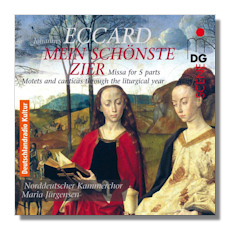
The Internet's Premier Classical Music Source
Related Links
- Eccard Reviews
- Latest Reviews
- More Reviews
-
By Composer
-
Collections
DVD & Blu-ray
Books
Concert Reviews
Articles/Interviews
Software
Audio
Search Amazon
Recommended Links
Site News
 SACD Review
SACD Review
Johannes Eccard

Mein Schönste Zier
- Mass "Mon Coeur se recommende à vous" for 5 Voices
- Motet "Zu dieser österlichen Zeit" for 6 Voices
- Motet "Übers Gebirg Maria geht"
- Motet "Zacharias war ganz verstummt"
- Motet "Freut euch, ihr lieben Christen"
- Motet "Vom Himmel hoch, da komm ich her"
- Motet "Maria Wallt zum Heiligtum"
- Motet "O Lamm Gottes, unschuldig"
- Motet "Sei fröhlich allezeit"
- Motet "Nun bitten wir den heilgen Geist"
- Motet "Allein zu dir, Herr Jesu Christ"
- Motet "Herr Jesu, Gnadensonne"
- Motet "Mein Schönste Zier"
- Motet "Verleih uns Frieden gnädiglich"
- Motet "Vater unser im Himmelreich"
- Hymn "Der Heilig Geist vom Himmel kam" (from Preuáische Festlieder II)
North German Chamber Chorus/Maria Jürgensen
Dabringhaus & Grimm MDG9021694-6 Hybrid Multichannel SACD 57m
Johannes Eccard (1553-1611) is an unjustly forgotten composer. Indeed, this excellent hybrid SACD from MD&G (Dabringhaus & Grimm) appears to be the only recording in the current catalog – one of fewer than a dozen on which the composer appears at all – to be devoted to his sonorous, gentle, graceful and highly pleasing works. The 16-strong North German Chamber Chorus under Maria Jürgensen here performs his mass, 14 motets and a hymn – unaccompanied choral works, none of which could be called unqualified works of genius, but all of which are elegant, perceptive and full of broad but direct musical appeal.
A Protestant from Mühlhausen, Eccard was employed twice in Catholic courts (Munich, where he was taught by Lassus; and Augsburg) before moving to Königsberg and finally as Kapellmeister in Berlin. Eccard's works were actually more widely known during his lifetime than might now seem likely; church choirs in the region continued to sing them even when the composer's wider historical context had been obscured. In fact, Eccard specialized in cantional motets, which represented an amalgam of the (sacred) motet with the even more lyrical world of song. Although the strict correspondence between text and melodic line is very German, the freer and slightly more florid latitude of the celebratory or admirational song has something of the Italian about it. Indeed one can almost hear Schütz in, say, Mein Schönste Zier [tr.18] as well as the more conventional German chorale tradition in Herr Jesu, Gnadensonne [tr.17]. Eccard wrote only one mass (as far as we know); this is its only recording.
The singing of the North German Chamber Chorus is excellent. Clean, perspicacious, unfussy yet highly sympathetic – both to the concerns of the composer whose work they are implicitly advocating and to the way in which listeners familiar with Renaissance polyphony, but probably less so with Eccard, will receive it. Their dynamics, in particular, bring freshness and expression to the performances… listen to the hushed hymn, Der Heilig Geist vom Himmel kam [tr.13] for a sense of meaningful progression through just two verses. Their confident yet "respectful" articulation which wonders at the appearance of the divine re-inforces the fervor with which Eccard must have meant the work to be heard. Yet never makes the awe unjustified because too forced. Jürgensen has her singers respond to Eccard's awe; not to the abstract concept of awe itself. Since the chamber choir was formed as recently as 2005 (this is their first recording), great things can be expected of them on this showing.
In common with other MD&G Super Audio CDs (this will play on CD-only equipment, of course), the sound and sense of presence are excellent. There is exactly the right amount of resonance… the recording from the end of 2010 was made in Cismar Abbey in Germany, and lends minimal but supporting atmosphere. The booklet contains useful background on composer and performers and the complete texts in Latin/German only. If the wonderful music from the more poorly lit corners of Renaissance polyphony, especially that from Germany, interests you, then this CD should be on your list. If you want to hear precise, thoughtful ensemble singing with character and commitment of music from any period, then take a look for that reason too.
Copyright © 2011, Mark Sealey.





















